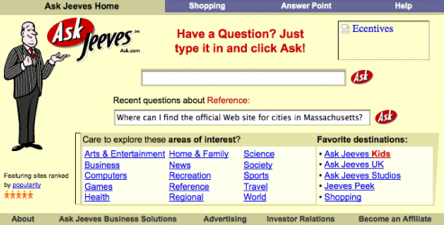Ask Making A Bigger Bet On “Social Search” Or Q&A
If you’re the number four search engine in a market that is looking like it’s going to be about two (maybe three) players in the long run, what do you do? If you’re Barry Diller and running the parent company of Ask, the search engine in question, you’re potentially looking at selling, with Microsoft as […]
If you’re the number four search engine in a market that is looking like it’s going to be about two (maybe three) players in the long run, what do you do? If you’re Barry Diller and running the parent company of Ask, the search engine in question, you’re potentially looking at selling, with Microsoft as a logical buyer. That’s all speculation at this point, however.
In the meantime, Ask is doing and trying a lot of things to keep users and redefine its role in this new, contracting or consolidating search landscape. Most recently it made a major push into shopping with “deals search.” Another major initiative to soon gain more momentum and visibility is something of a return to Ask’s roots as a “Q&A” engine. (The picture immediately below is circa 2001.)

Ask, which has been highlighting “answers” for some time, is going to move more directly into social search or real-time Q&A.
Ask President Doug Leeds told me the other day that Ask still gets a huge number of queries formulated as questions. In recognition of that and the more recent rise of social and “real time” search, Ask will begin to enlist its community directly in answering questions and use a number of sophisticated algorithms around question routing and identifying trustworthy and authoritative answers and people.
If well executed it could be an effective strategy for the company (including in mobile), which despite many years of innovative efforts under former CEO Jim Lanzone was not really able to grow its share beyond 4 percent of overall traffic.
Q&A services have been around for quite some time, while “social search” and “real time search” are newer phenomena. We could identify a range of companies that are in one way or another enlisting humans to answer queries or questions. Beyond Yahoo Answers, Mahalo and others like them, there are Aardvark, kgb, ChaCha, not to mention Facebook and Twitter, that fall into these categories to varying degrees. And Google recently introduced “social search” seeking to bring humans more directly into search results.
Leeds said to me that almost nobody in the segment today is going to be able to do what Ask can do with social search/Q&A “at scale.” I think that the strategy makes a great deal sense for Ask. Whether it people ultimately use it will depend entirely on execution.
Contributing authors are invited to create content for Search Engine Land and are chosen for their expertise and contribution to the search community. Our contributors work under the oversight of the editorial staff and contributions are checked for quality and relevance to our readers. The opinions they express are their own.
Related stories
